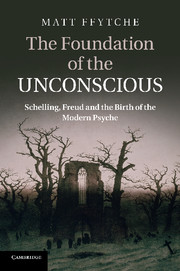Book contents
- Frontmatter
- Contents
- Acknowledgements
- Introduction: the historiography of the unconscious
- Part I The subject before the unconscious
- Part II The Romantic unconscious
- 3 Divining the individual: towards a metaphysics of the unconscious
- 4 The historical unconscious: the psyche in the Romantic human sciences
- 5 Post-idealism and the Romantic psyche
- Part III The psychoanalytic unconscious
- Bibliography
- Index
- References
5 - Post-idealism and the Romantic psyche
Published online by Cambridge University Press: 05 December 2011
- Frontmatter
- Contents
- Acknowledgements
- Introduction: the historiography of the unconscious
- Part I The subject before the unconscious
- Part II The Romantic unconscious
- 3 Divining the individual: towards a metaphysics of the unconscious
- 4 The historical unconscious: the psyche in the Romantic human sciences
- 5 Post-idealism and the Romantic psyche
- Part III The psychoanalytic unconscious
- Bibliography
- Index
- References
Summary
Pathologies of the idea
I have looked at four very different currents of late German Romantic thought – speculations about primordial history; the rediscovery of negative theology; a science of myth and revelation; and theories concerned with transfigurative states of development. Together, they show the breadth of Schelling’s conceptual turn to the unconscious, and the forms in which this unconscious could be identified in cultural and historical theory. Each of these discourses, as well as centring the self in relation to an unconscious past, also constructs that foundational relation through the psyche. The psychic bonds linking the individual to its unconscious past are of various kinds. They appear in one case as a magical or oracular relation to truth; in another as a loss of consciousness that paradoxically founds the self; in yet another as an inner madness which the self seeks to escape; and lastly as a crisis in self-experience which produces a view into the ‘inner’. These discourses are not entirely separate, and are always capable of evoking each other. Schelling’s Munich lectures of 1827–28 on the ‘System of the Ages of the World’ characteristically skip from one trope to another, circling around a principle of unconsciousness which is constantly surmised, rather than directly, psychologically, investigated.
The intimations of the psyche here are never fully integrated by Schelling into a complete theory of psychic life, and the vocabulary through which he constructs the psyche as a medium of the self is constantly shifting. What remains constant, however, is that the psychic opens up aspects of self-experience which are more directly involved (than normal consciousness) in the ‘essence’ or foundation of the person as individual. From these co-ordinates, as we have seen, there developed a remarkable series of psychoanalytic notions avant la lettre – the unconscious, repression, forgetting, the self’s duality and historicity, an uncanny relation to the past, and the potentiation of the self. It now remains to examine how these various strategies for describing and conceptualising the individuality of the self and its unconscious grounds were integrated with the field of Romantic psychiatry and psychology itself. It is here that the philosophy of the I completes its conversion into a psychology of the unconscious; at the same time these terms of ‘crisis’ and ‘concealed grounds’, dual identities and obscure origins, begin to function concretely within a new, Romantic science of the soul.
- Type
- Chapter
- Information
- The Foundation of the UnconsciousSchelling, Freud and the Birth of the Modern Psyche, pp. 178 - 214Publisher: Cambridge University PressPrint publication year: 2011



